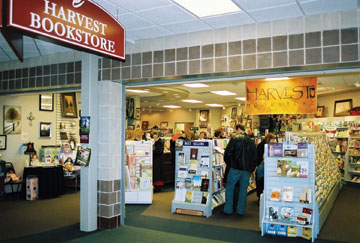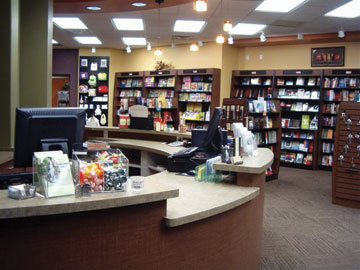
By Rez Gopez-Sindac
If operated as a business — with trained staff, best practices and a clear purpose.
If you are the senior pastor of a church that has a bookstore, its rise or fall also depends on you, so says Lorena Allen, manager of Harvest, a bookstore owned by Eastview Christian Church in Normal, IL.
In the early stage of a bookstore’s life, church staff may be a bit skeptical, according to Allen. It is during this time, she argues, that the support of the senior pastor is most helpful in getting everyone on board.
“The senior pastor must be an advocate of providing resources to his sheep,” Allen adds. “When the senior pastor makes recommendations, people buy it.”
 Indeed, Allen says the only marketing tactics Harvest uses are the pastors’ recommendations and the fact that its location is right next to the main auditorium.
Indeed, Allen says the only marketing tactics Harvest uses are the pastors’ recommendations and the fact that its location is right next to the main auditorium.
It’s also a fact that Eastview’s former pastor, Gary York, and volunteers Jim and Bonnie Carroll started Harvest store in November 1992 after learning from an article that a high percentage of Christians had never been into a Christian bookstore.
Start small, grow profitable
Harvest bookstore started in the church’s hallway, in time for Christmas. Allen says it was so successful that the church continued doing it every week on a consignment basis with Provident Bookstore, a local retail outlet. Eventually, the church had to take a $100,000 loan to start a bigger store in a classroom. Around this time, Eastview was averaging 1,000 people every weekend.
“Our bookstore has made money over the years,” says Allen. “My predecessors did a good job of building a solid base.”
Six years ago, the church remodeled the store and purchased all-new fixtures and furniture without a loan. Since that time, Allen says the bookstore has been profitable and has built the revenue back to nearly what it was before the remodel.
Ted Terry, Lakewood Church Bookstore in Houston, TX, manager for nearly nine years, says his church’s store also started as a small, 400-square-foot lending library operated completely by volunteers. “Today, we are a full-service, 10,000-square-foot retail store open seven days a week with 18 employees and more than 40 volunteers,” he adds.
When asked how profitable Lakewood Bookstore is, Terry declines to share the revenue numbers, but says, “The bookstore is profitable, and we are able to bless many other ministries, charities and mission organizations outside of Lakewood Church because of our success.”
How to make it work
The success of a bookstore, Terry says, is a direct result of the experience, dedication and passion of those who are put in charge of operating and maintaining the bookstore. He points out that “although Lakewood Bookstore is a ministry first, it is a business, and must be maintained and operated as such.”
A good staff is critical, Terry adds. “I have been involved in the Christian bookstore industry for more than 25 years, and the best stores are always managed with a team mentality. A good team of dedicated, well-trained staff that truly believes in what they are doing will make a difference in the lives of others.”
For Geni Hulsey, president of The Church Bookstore Network, a good store manager who is paid and a part of the church staff is key to making a church store successful.
“Recent trends in how people get information, read books and listen to music have greatly affected how bookstores are managed,” she shares. “A good manager will follow these trends and react to them in such a way as to safeguard the financial standing of the bookstore.”
One example she cites is that according to recent statistics, the most downloaded category of books is fiction. She argues that a good manager will reduce the amount of fiction she carries. “Staying current and tech-savvy is vital in managing a store.”
Not for every church
Hulsey says the most likely churches to start bookstores are the megachurches, those who see a steady weekly attendance of 2,000 people or more. Another factor that seems to play a huge part in the decision is if the pastor has written any books or study materials.
Whether a church has the capacity to pay a salary is an important consideration as well. Hulsey believes one paid person, either part-time or full-time, needs to be a priority at the onset.
 “This gets back to accountability and being involved in decision making regarding the store,” she says. “It becomes critical if the store is open more than the four to six hours surrounding services and/or if the store begins to grow beyond the table on which it was started.”
“This gets back to accountability and being involved in decision making regarding the store,” she says. “It becomes critical if the store is open more than the four to six hours surrounding services and/or if the store begins to grow beyond the table on which it was started.”
Before venturing into a retail business in your church’s property, Terri M. Williams, bookstore director at Oak Cliff Bible Fellowship in Dallas, TX, says to consider three things: First, is God calling the church to open a store? Second, is there is a viable need for a store – or should the focus be on supporting your local bookstore? Finally, do you have the appropriate size of membership to support the store?
Williams says the OCBF Bookstore started because the church leaders saw the need to provide Christian resources to the congregation. It opened in October 1988 with an inventory of $10,000. Today, it occupies 1,400 square feet of space with an inventory of $85,000.
Ongoing challenges
The legal and tax implications of owning and managing a church store is “huge and getting to be bigger every year” as the IRS takes notice of the proliferation of retail sales inside nonprofits but especially churches, says Hulsey.
To protect your nonprofit status and your exemption from property taxes, Hulsey advises bookstore managers to “know your state’s sales tax rules and the federal government’s rules.” This is not anything to be afraid of, she says, “just be sure you know and understand the rules and play by them. “Having a good tax attorney that understands this kind of business practice is vital for the church with any kind of retail income.”
For Lakewood Church Bookstore’s Ted Terry, competition from online retailers and big box retailers like Target, Walmart and Costco is a concern, as they “compete very heavily in our marketplace now.” Also, e-books, iTunes and other websites with downloadable content offer competition.
On the other hand, lending a voice to publishers and suppliers who sell to church stores, Eric Grimm, strategic partnerships manager at Christian Booksellers Association, says, “Over the past several years, church buying has been more decentralized as volunteers buy for educational or missional projects based on their personal buying habits, which may include Internet purchasing, using favorite secular stores, or other avenues that don’t always go through a church purchasing process.”
In addition, Grimm says larger churches often create their own materials and resources and don’t purchase from outside sources. “Many larger churches with stores attend our summer event, the International Christian Retail Show, to see and purchase Christian materials and resources from about 300 exhibitors including Christian publishers, music companies, gift and specialty companies, church-supply vendors, and more. The event also provides specialized retail training to help improve operations, profitability and sales.”
Grimm says there are more than 260 church stores that are CBA members.
__________________________________________________
5 keys to bookstore success
In 2007, Lakewood Church Bookstore was named “Bookstore of the Year” by the Church Bookstore Network. Ted Terry, Lakewood Church Bookstore manager, says the national award was based on votes by other church bookstore managers, Christian publishers, music and gift companies, and other industry leaders. “It was based on the bookstore’s contribution, innovation and reputation within our industry,” he adds.
When asked what advice he would give church store managers who are either starting or looking to take the bookstore operation into a new level, Terry cites the following:
- Begin slowly. Do not try to get too big too quick. Build your customer base and learn what it is they are expecting and needing from their church bookstore. It is better to have a small store that is well-stocked, properly laid out and designed correctly, than to have a large space full of unattractive displays and products that are not relevant for your church.
- Depend on the knowledge of good salespeople. If you find a sales rep you trust, pick their brain for information. Let them help and guide you. They are some of the best teachers you will find. Be careful though – several good ones are out there, but there are also plenty who will take advantage.
- Train your staff and volunteers well. Have weekly contests, take-home tests, training “parties” any other inventive, fun ways to educate the staff on customer service issues and the products that they’re selling. Tyndale, Thomas Nelson, and Zondervan offer free in-store seminars, DVD training and other valuable resources on how to sell Bibles, books and other resources. They even offer free Bibles to your staff who complete the training.
- Make sure you have a clear purpose for your bookstore. Write down everything the pastor and board expects of you. If you ever start to fall away from that vision, you might be doing something wrong, or perhaps it is time to redefine the goal for your bookstore.
- Visit other church bookstores and similar businesses. Look at what they are doing that you like. Take notes on display ideas, products, anything that you think you might be able to use in your store. Encourage your staff to do the same. You will be surprised at how much you can learn from your competition.
__________________________________________________
Resources in this article:


